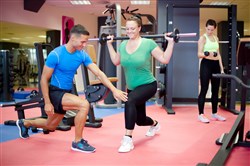VOL. 38 | NO. 1 | Friday, January 3, 2014
Weigh in line: January is the cruelest month for waiting around on gym newbies
By Joe Morris

New gym members are advised to take it easy in the beginning and find a workout they enjoy.
-- Shutterstock.ComThinking about weight loss or an exercise plan? If not, just click on the TV or flip through a magazine.
The barrage of gym and equipment soon will worm their way into your psyche, and then it begins: Is a gym membership is a good idea? Personal trainer? Exercise bike? Where’s that jump rope? Is the fudge gone?
January is, by far, the biggest sign-up month for fitness facilities, from the YMCA to smaller, neighborhood outfits. More than 12 percent of members join in January, according to the International Health, Racquet, and Sportsclub Association.
February and March also are above average, with around 9 percent more bright-eyed enthusiasts each month.
What this means for regulars is wait times for machines and crowded classes for yoga, Pilates, Zumba and other popular workouts. For newcomers, it’s an opportunity to get moving on an exercise program, but also one that is fraught with peril.
“Most of the time people start because they have a New Year’s resolution around the guilt they feel about how much they ate over the holidays,” says Tommy Holt, a personal trainer who works with clients at Gym 5 in East Nashville.
“They want to make a life change, and exercising is one of a million resolutions they’ll come up with because they want to shed what they’ve just gained.”
Holt tells his clients to maintain an even diet through the holidays and the rest of the year to avoid that kind of up-and-down gain and the guilt that follows.
“Be reasonable and gentle with yourself; eat what you want, but know that if you overdo it you’ll have to deal with that later,” he says.
“Take a more laid-back approach, so that you have less to deal with if you do decide to start an exercise regimen.”
The thing to remember is that dieting is good, and exercise is good, but for maximum benefit you should be doing both. And that means finding a workout that suits your age, size and interests.
“People come in all fired up in January, and then they fall off if they don’t lose 10 pounds in two weeks,” says Kim Watson, who currently teaches Pilates and Zumba at the YMCA of Middle Tennessee’s Downtown location and has been teaching group exercise there for 13 years.
“Don’t expect too much, because you’ll increase your chances of burning out. If you want to lose 20 pounds in a month you can make that happen, but the weight’s not going to stay off. Go slow so you can get it off and keep it off.”
With that in mind, Watson and Holt both recommend easing into a workout regimen, be it group exercise, circuit weights, swimming or just walking. Make it your own, and keep some mental blinders on when it comes to the buff physiques that seem to surround you.
“There are lots of people in the same boat you are,” Watson says. “Many are starting for the first time, many are coming back.
“Do not look around to see how everybody else is doing it. Don’t mimic the instructor; we’ve been doing it for years. Do what you can do, and stick with it, and your results will come.”
Taking a measured approach also will help you find the right style of exercise, Holt adds.
“There are a lot of different methods and routines out there, but if you’re doing something that’s hard on the joints, and you’re older, then you’re not going to keep that up long term,” he says.
“I work with a lot of people who aren’t in it so much for appearances, but for going to the doctor and finding that they’ve lost weight, and that their cholesterol and other numbers are better. They’re able to do more housework, or mow the lawn, without getting tired.
“People focus on getting into a certain outfit, or looking a certain way, when just having a better regular life is a real goal.”
It’s also good to make it be fun, or as much fun as exercising can be.
“If you don’t like it, you won’t keep doing it,” Holt says. “Experiment until you find what you like. People in this country aren’t in bad shape because they’re doing the wrong exercises, but because they’re not doing anything.
“If all you want to do is swim a few laps but make no dietary changes, you’re still in better shape than if you ate crappy food and just sat on the sofa. Just by doing something you’re going to have a better quality of life, even if you don’t look great in a bikini.”
But if looking good is a goal, sticking with diet and exercise can also be made easier by a reward system, Watson notes.
“You can use other people as motivators, which is not bad, but if they stop exercising you might do so as well,” she says.
“Instead, come up with a plan that says, ‘If I work out so many times, I get to go and buy something.’ Create your own reward system. That will keep you motivated.”